Categories
- animatronics (12)
- apple (11)
- arduino (179)
- art (41)
- articles (121)
- artificial intelligence (11)
- automation (421)
- avr (205)
- bitcoin (3)
- breadboard (9)
- cameras (57)
- cars (26)
- cell phones (28)
- clothing mods (21)
- console mods (26)
- dangerous (94)
- desktop mods (24)
- embedded (5)
- flying things (54)
- fpga (22)
- gaming creations (108)
- interface (225)
- internet (17)
- laptop mods (6)
- lasers (22)
- linux (7)
- magnetic (3)
- medical (12)
- microcontrollers (51)
- misc projects (152)
- msp (12)
- music (124)
- pic (90)
- projects (23)
- pyroedu (76)
- raspberry pi (26)
- robots (312)
- security (36)
- sensors (307)
- software (200)
- solar (19)
- stamp (9)
- tools (149)
- tutorials (98)
- Uncategorized (45)
- usb (44)
- wireless (256)
Sponsors


Posted January 15, 2020 by Chris
“I’ve been working on creating a cheap, time-lapse camera that people could use to ‘sense’ the world around them. The cost of such a device would be around $10, when all is said and done, and having multiple of these devices would open up options for public computing that people have not considered – a world where people are willing to deploy “personal, public” electronics throughout their environment with the same ubiquity, recyclability and reusability as paper.”
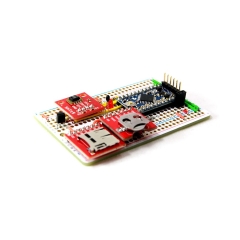
Posted January 6, 2020 by Chris
“The temperature and relative humidity of indoor air is an important parameter that can influence indoor microbial survival, abundance, and community structure. Temperature and relative humidity can also be used to infer other information about indoor environments, such as whether or not it is being heated or cooled.”
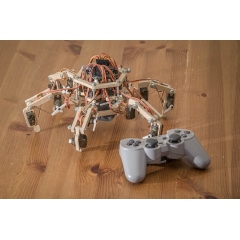
Posted December 30, 2019 by Chris
“Stubby is an evolving hexapod robot which I am making, with contributions from my 6 year old daughter and a co-worker. I have long wanted to make a walking robot, thanks to shows like Stargate SG-1. While Stubby is not the same, it has been a very entertaining and educational project to work on.”
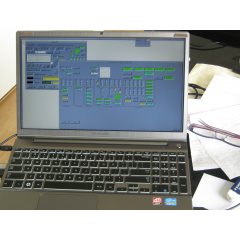
Posted December 16, 2019 by Chris
“Some extra hardware and software changes the Raspberry Pi into a DVB-S digital TV transmitter. The code and diagrams are released under the GPL license. Credits: This project would not have been possible without the pioneering done by Jean-François Fourcadier, F4DAY. I also made use of simplifications made by F4AGC, I simply simplified things some more. “
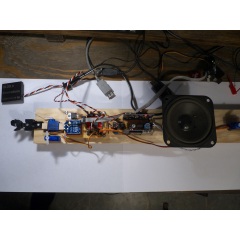
Posted May 18, 2018 by Chris
"As we enter 2014, I thought I would post up a recap of what I’m working on. Primarily I’m developing a wireless method for controlling moving vehicles. In my particular case, this is Garden Scale (G) model train locomotives. However the principles and widgets I’m designing could be used to drive almost anything via real time wireless up to a distance of about 300 ft."
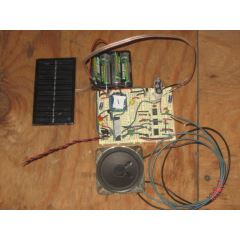
Posted April 19, 2018 by Chris
"The project consists of eight modules (creatures) that operate independently, but coordinate their efforts to perform a common task. Each module implements a solar panel to collect the energy needed to operate (feeding) and communicates using radio transmissions. These mechanisms allow the system’s overall behavior to mimic the interactions of prairie dog and mongoose colonies."
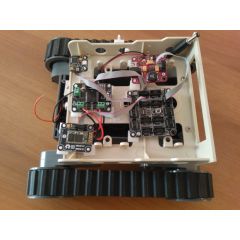
Posted April 11, 2018 by Chris
"In this post, I’ll show how to construct a robot with .NET Gadgeteer and how to control it using a Bluetooth connection from a PC application based on the 32feet.NET library. Let’s start from .NET Gadgeteer part. The base of our robot is the Rover 5 Tank Chassis, that provides two motors that can be easily controlled by the Motor Driver L298 Module."
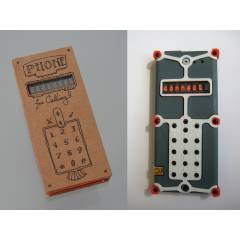
Posted February 20, 2018 by Chris
"An exploration into the possibilities for individual construction and customization of the most ubiquitous of electronic devices, the cellphone. I investigate the implications of digital fabrication and open-source hardware for DIY practice."
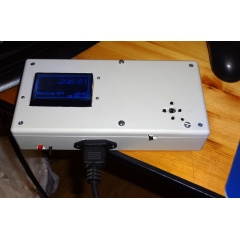
Posted February 4, 2018 by Chris
"This post will be divided down into two main sections: hardware and software. I will try to explain with detail while keeping it short, and cover some of the key elements and choices involved in making this project."
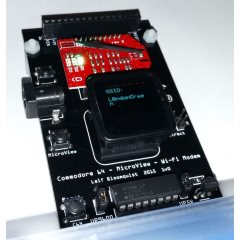
Posted January 23, 2018 by Chris
"The Commodore Wi-Fi Modem is built around two main components: The Arduino-compatible MicroView with built-in OLED screen, and the Roving Networks RN-XV or ‘Wifly’ wireless module. These give you significant flexibility to use it as a straight-forward wireless solution for your Commodore, with optional expandability for standalone use or as a platform for interfacing to the outside world. "






